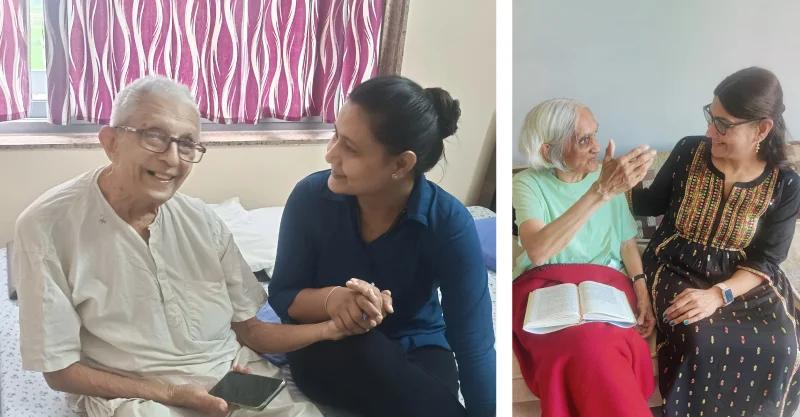Introduction
Growing older often means managing one or more chronic illnesses, such as diabetes, heart disease, or arthritis. While these conditions affect physical health, they can also deeply affect mental well-being. For many seniors, living with a chronic illness can lead to feelings of depression, anxiety, and loneliness. This is where psychiatric care for seniors becomes crucial, addressing both their physical and mental health to ensure a better quality of life.
In this blog, we’ll dive into how chronic illness and mental health are connected, the importance of psychiatric care, and how PapayaCare takes a comprehensive approach to support seniors facing these challenges.
Understanding the Mental Health Needs of Seniors with Chronic Illnesses
When we think about caring for seniors with chronic conditions, we often focus on managing their physical symptoms. But the emotional strain that comes with long-term illness can be just as challenging. Seniors may feel overwhelmed by the daily struggle of managing medications, dealing with physical pain, or losing the ability to participate in activities they once enjoyed. This can easily lead to mental health issues such as depression or anxiety.
Imagine a senior with arthritis who experiences constant pain, making it difficult to move around or even sleep well. Over time, these struggles may lead to a sense of isolation and frustration. It’s easy to see how chronic illness can affect a person’s mental state. That’s why understanding the mental health needs of seniors with chronic illnesses is so important, addressing both their physical and emotional pain is essential for their overall well-being.
The Link Between Chronic Illness and Mental Health in Seniors
The relationship between chronic illness and mental health is well-documented. Seniors with chronic health conditions are more likely to experience depression, anxiety, or even cognitive decline. Here are a few reasons why:
Physical Limitations
Chronic illnesses often limit seniors’ ability to stay active, socialise, or engage in their favourite activities. This can cause emotions of loneliness or frustration.
Chronic Pain
Ongoing pain from conditions like arthritis or diabetes can make it hard for seniors to sleep, enjoy daily activities, or maintain a positive outlook on life.
Medication Side Effects
Some medications prescribed for chronic illnesses may have side effects that impact mood or energy levels, contributing to emotional distress.
Cognitive Decline
Conditions like Alzheimer’s or Parkinson’s disease often bring mental challenges, including memory loss and confusion, which add to the emotional burden.
For these reasons, mental health support becomes a key part of managing chronic illness. Psychiatric care for the elderly can help address these issues, improving not just their mental well-being but also their physical health.
The Role of Psychiatric Care in Managing Chronic Illnesses
Psychiatric care can make a huge difference in helping seniors manage the emotional and psychological challenges that come with chronic illnesses. Here’s how it helps:
Emotional Support
Therapy and counselling provide seniors with a safe space to talk about their struggles and learn coping mechanisms for dealing with the emotional weight of their illness.
Better Treatment Compliance
When seniors feel emotionally overwhelmed, they might neglect their treatment or medication routines. Psychiatric care helps address emotional barriers, which can improve their adherence to medical care.
Cognitive Health
For those experiencing cognitive decline, psychiatric care often includes activities and therapies aimed at maintaining brain function and slowing the progression of diseases like dementia.
Integrating psychiatric care for seniors into their overall treatment plan ensures both physical and mental health are taken care of, leading to better outcomes in the long run.
You may like to read this: Exploring the Benefits of Psychiatric Assisted Living
Comprehensive Care Approaches
At PapayaCare, we believe that a well-rounded approach to care is the key to improving the quality of life for seniors with chronic illnesses. This means addressing their mental health needs just as carefully as their physical health. Here’s how we do it:
Personalised Care Plans
Each senior is unique, as are their needs. We develop individualized care plans that take into account both the chronic illness and the mental health challenges a senior may face.
Emotional and Psychological Support
Our caregivers are trained to provide compassionate support, offering counselling and therapy to help seniors navigate feelings of sadness, frustration, or anxiety.
Family Involvement
We believe family plays a critical role in a senior’s mental health. That’s why we encourage open communication between caregivers, seniors, and their loved ones to ensure everyone is on the same page.
Cognitive Therapy
For seniors with cognitive decline, we offer therapies designed to help maintain mental sharpness, slow down memory loss, and improve overall brain health.
Types of Psychiatric Treatments for Seniors
There are various ways to approach psychiatric care for the elderly, depending on the individual’s needs and the severity of their mental health challenges. Here are some common treatments:
Psychotherapy
Also known as talk therapy, this allows seniors to explore their emotions, fears, and anxieties with a mental health professional. It’s a safe way to develop coping mechanisms for dealing with chronic illness.
Medication
Sometimes, seniors may need medication to help manage symptoms of depression, anxiety, or cognitive decline. This needs to be closely monitored, especially if they are already taking medication for their physical condition.
Inpatient Psychiatric Care
In cases where mental health issues are severe, inpatient psychiatric care may be necessary. This type of care provides 24-hour support, ensuring seniors get the intensive treatment they need.
Residential Psychiatric Care
For seniors requiring long-term psychiatric care, a residential setting can offer continuous support in a home-like environment. This option is ideal for those with severe mental health or cognitive issues who need around-the-clock care.
Conclusion
Caring for seniors with chronic illnesses means going beyond physical treatments, it requires addressing their mental health as well. Psychiatric care plays an essential role in helping seniors manage the emotional toll that often comes with chronic illnesses. By integrating mental health care into their treatment plans, seniors can live more comfortably and maintain a better quality of life.
At PapayaCare, we’re dedicated to providing this holistic care, ensuring that seniors’ physical, mental, and emotional needs are all met. With our compassionate approach and focus on personalized care, we aim to improve the lives of the seniors in our care, helping them navigate both their chronic illnesses and their emotional well-being.
















